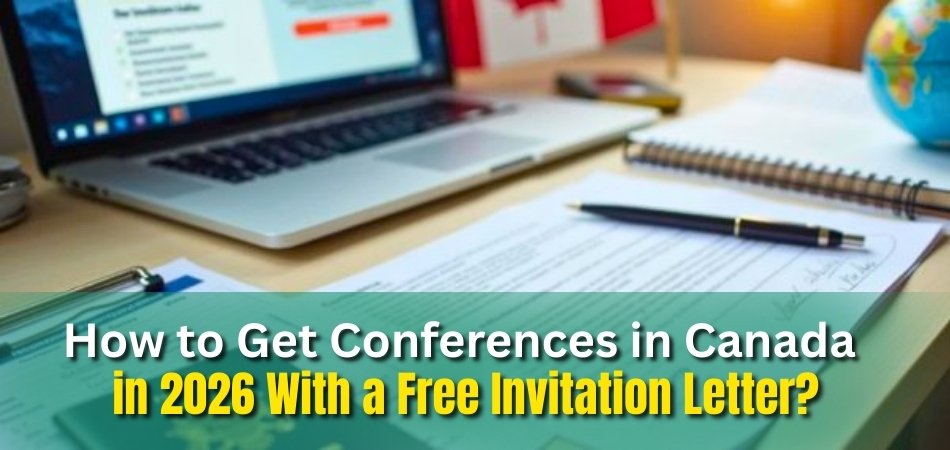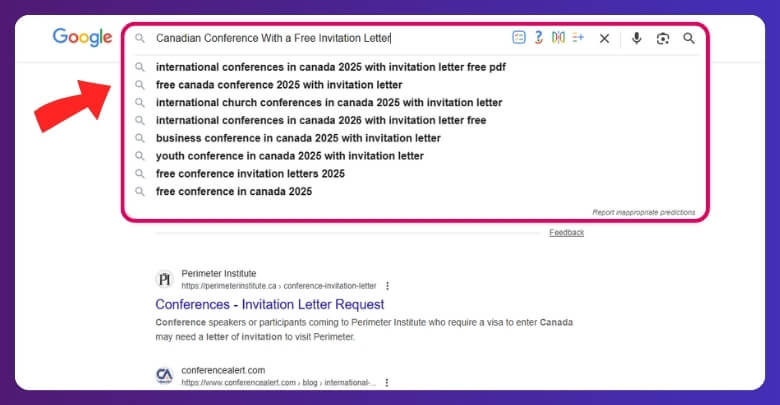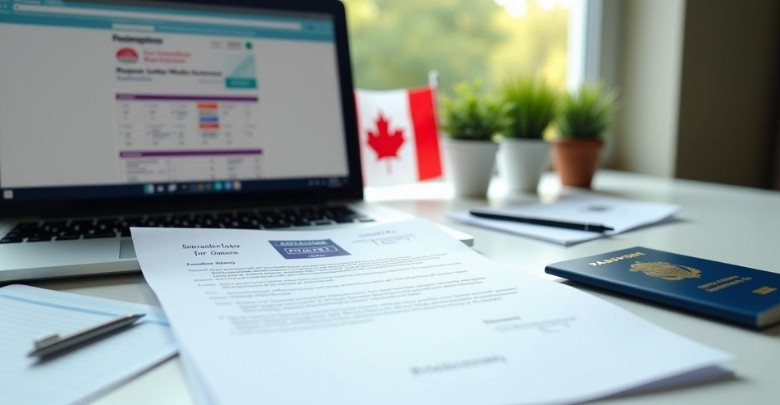Conferences in Canada attract professionals, researchers, and students from around the world to exchange ideas, grow networks, and share knowledge. In 2026, many top events will take place across fields like technology, health, business, and science. If you’re planning to attend, getting a free invitation letter can make the process smoother—especially for visa or employer support.
Wondering how to get conferences in Canada in 2026 with a free invitation letter?
To get conferences in Canada in 2026 with a free invitation letter, choose a legitimate conference, complete registration or abstract submission, then request the official invitation letter from the organizer. Most conferences issue free digital invitation letters to confirmed participants for travel, employer, or visa support.
Learn how to find verified events offering free invitation letters for 2026. Get tips on completing requirements successfully and avoiding common mistakes. Keep reading to explore helpful steps, tools, and event examples you can use now.
Quick Canada Conference Visa Requirements
To attend a conference in Canada in 2026, you’ll need to meet certain visa requirements. These help prove that you’re visiting for a short time, with a valid reason, and that you plan to return home. Below is a quick, simple checklist to guide you:
- Valid passport: Make sure your passport is valid for at least six months beyond your planned return from Canada. A damaged or soon-to-expire passport can delay or stop your visa application.
- Conference invitation letter: You must include an official invitation letter from the conference organizer showing your confirmed participation. This proves your reason for travel is genuine and professionally related.
- Proof of conference registration: Attach your registration confirmation or payment receipt to show you’ve secured a place in the event. This also helps support your claim that you’re attending for a specific purpose.
- Proof of funds: Show recent bank statements or a sponsor letter to confirm you can cover travel, stay, and return. Officers want to see that you won’t need to depend on public support during your visit.
- Purpose of travel explanation: Include a short cover letter clearly stating why you’re traveling and your conference goals. If you’re joining international conferences in Canada, mention how the event relates to your career or field.
- Proof of ties to home country:Provide documents like a job letter, family details, or school enrollment to show you’ll return home. This reduces the risk that you’ll overstay your visa.
- Biometrics (if required): Some applicants must give fingerprints and a photo at a visa center after submitting the application. You’ll get an instruction letter if this step applies to you.
- Online application via IRCC: Apply through Canada’s official immigration site by filling in forms and uploading your documents. You’ll also pay your visa fee and get updates through your IRCC account.
How to Get Conferences in Canada in 2026 With a Free Invitation Letter?
Finding and joining conferences in Canada takes planning, clarity, and careful checks. Many organizers offer free invitation letters to confirmed participants, but only when you follow the correct process. The steps below explain how to choose real conferences, qualify properly, and secure an invitation letter without confusion or risk.
Step 1: Choose Your Topic, Format, and Location
Start by identifying your academic, business, or professional field and preferred conference format carefully. Decide whether in-person, hybrid, or online attendance suits your goals, schedule, and budget. Choosing a relevant topic improves acceptance chances and makes invitation letter requests more credible.
Step 2: Shortlist Legitimate Conferences
Search for conferences with clear organizers, published agendas, real speakers, and verifiable contact details. Avoid events promising guaranteed visas or instant approvals without proper registration or review. A legitimate conference always explains its purpose, fees, and participation rules transparently.
Step 3: Review Invitation Letter Policy
Check whether the conference provides free invitation letters after registration or only after abstract acceptance. Read eligibility rules carefully, including deadlines, required details, and delivery format of the letter. Understanding this policy early prevents delays and unnecessary payments later.
Step 4: Register or Submit an Abstract
Complete conference registration or submit your abstract according to the event’s stated participation rules. Use accurate personal information that matches your passport to avoid document issues. Successful registration or acceptance usually unlocks eligibility for an official invitation letter.
Step 5: Request the Invitation Letter
Contact the organizer through the official channel and request the invitation letter politely and clearly. Provide full name, passport details, conference title, and participation status without errors. Clear communication helps organizers issue correct letters faster and reduces revision requests.
Step 6: Verify Invitation Letter Details
Check the invitation letter for correct name spelling, dates, venue, and organizer contact information. Ensure the letter clearly states your participation and conference purpose. A verified letter builds trust with employers, sponsors, and immigration officers reviewing your documents.
Step 7: Use the Letter Appropriately
Use the invitation letter for travel planning, employer leave approval, or visa application support when required. Do not claim it guarantees entry or visa approval under any circumstances. Always combine the letter with strong personal and supporting documents.
What Counts as a “Legitimate Conference” in Canada?
Before registering, you should understand what separates a real conference from unreliable events. Legitimate conferences follow clear standards that protect participants and support professional goals. Knowing these criteria helps you avoid scams, wasted money, and document problems later. Here are the key criteria:
Clear Organizer Identity
A legitimate conference clearly shows the organizer’s legal name, background, and contact details on its website. Real organizers share office addresses, working emails, and verifiable phone numbers. The invitation letter should also be issued by an authorized person, such as a conference chair or organizing secretary, whose name and role are clearly mentioned. This transparency builds trust and confirms the event operates responsibly in Canada.
Published Agenda and Speakers
Authentic conferences publish a detailed agenda with session titles, schedules, and confirmed speakers. Speaker profiles usually link to universities, companies, or professional work. This structure proves the event offers real academic or professional value, not vague promises.
Verifiable Venue Information
Reliable conferences list an exact venue, city, and event dates that you can independently verify online. Hotels, universities, or convention centers often confirm bookings publicly. The invitation letter should repeat these same details to stay consistent. This clarity helps attendees plan travel and confirms the conference exists in a real location or approved online format.
Transparent Registration Rules
Legitimate conferences clearly explain registration fees, refund policies, deadlines, and participation types. They also state that the invitation letter comes with registration and does not require a separate fee. Clear rules about payment and refunds help participants understand financial responsibility before applying for a visa.
Ethical Invitation Letter Policy
A real conference issues invitation letters that meet immigration expectations. A proper letter clearly states the conference name, dates, location, and the attendee’s full name. It includes the organizer’s contact details, signature, and date of issue. Legitimate conferences never promise visa approval. They only confirm participation, which aligns with travel and immigration requirements.
How to Use Google to Find a Canadian Conference With a Free Invitation Letter?
Google helps you discover real Canadian conferences when you search with purpose and verify details carefully. Using the right keywords, filters, and checks allows you to identify events that offer free invitation letters. The methods below show how to search smartly and avoid unreliable listings.
Use Specific Search Keywords
Search using detailed phrases like “Canada academic conference 2026 invitation letter” or “business conference Canada free invitation.” These focused terms narrow results and reduce low-quality listings. Adding your field or city further improves accuracy and saves research time.
Check Official Conference Websites
Open results that link to full conference websites instead of listing pages only. Review the organizer details, agenda, and invitation letter policy carefully. Legitimate conferences clearly explain participation steps, eligibility, and contact information without vague language or pressure tactics.
Add Year and Location Filters
Include the year, city, or “2026” in your search to avoid outdated conferences. Google filters help you find current and upcoming events faster. Location-based searches also confirm whether the conference plans in-person, hybrid, or online participation.
Review Organizer Credibility
Search the organizer’s name separately to confirm past events, reviews, or institutional ties. Reliable organizers often appear across multiple trusted sources. This step helps confirm authenticity before registration and supports confident requests for a free invitation letter.
Look for Invitation Letter Mentions
Scan pages for sections titled “Visa Information” or “Invitation Letter Policy.” Conferences offering free invitation letters explain conditions clearly. Google’s “find on page” tool helps you locate this information quickly without scanning entire pages.
Who Can Get a Free Invitation Letter?
Many conferences offer free invitation letters to specific participant groups based on role and eligibility. Understanding who qualifies helps you plan correctly and avoid unnecessary delays. The categories below explain the most common participants who can request invitation letters without extra cost.
Registered Attendees
Registered attendees usually receive free invitation letters after completing conference registration and confirming participation successfully. Organizers issue these letters to verify attendance purpose and event details clearly. Registration confirms seriousness and allows organizers to generate accurate documents for travel or professional use.
Accepted Presenters
Accepted presenters qualify for free invitation letters after abstract or paper approval by the review committee. This status proves academic or professional contribution to the conference program. Organizers support presenters by issuing letters that confirm presentation roles and scheduled participation dates.
Speakers or Guests
Speakers and invited guests receive invitation letters directly after official selection by conference organizers. These participants often deliver talks, panels, or workshops during the event. The invitation letter confirms their role and supports travel, institutional approval, or sponsorship requirements.
Student Participants
Students may receive free invitation letters when conferences allow student participation and require enrollment proof. Organizers often request student identification or university confirmation. This option supports academic exposure while ensuring only eligible students request official invitation documents.
Sponsored Participants
Sponsored participants qualify when an employer, institution, or organization covers conference-related expenses. Organizers request sponsor details to confirm funding arrangements. The invitation letter reflects sponsorship support and participant role, which helps during leave approval or travel planning.
How to Request a Free Invitation Letter (Step-by-Step)
Requesting a free invitation letter works smoothly when you follow the correct order and share accurate information. Conferences issue these letters only after confirming eligibility and participation details. The steps below explain what you must do and what a proper invitation letter should include:
What to Do:
Before requesting a free invitation letter, you must complete a few essential steps correctly to confirm eligibility and avoid document problems later while ensuring smooth communication with conference organizers throughout the process.
Register or Submit Abstract
- Complete conference registration or submit your abstract carefully according to stated rules before requesting any invitation letter.
- Review eligibility conditions on the conference website to ensure your participation type qualifies for invitation issuance.
- Save confirmation emails or submission receipts because organizers often require proof before processing invitation letter requests.
Provide Passport Details
- Share your full legal name exactly as written on your passport to prevent future document mismatches.
- Enter passport number and birth details accurately because organizers copy this information directly into invitation letters.
- Double-check spelling and formatting before sending details, since corrections later may delay letter issuance timelines.
Confirm Event Information
- Verify the conference title, city, and venue using the official website before requesting the invitation letter.
- Match event dates with your travel plan so the invitation reflects realistic arrival and departure intentions.
- Confirm whether the event format is in-person, hybrid, or online to avoid confusion during documentation review.
What the Organizer Should Include?
Before issuing an invitation letter, conference organizers must include specific details that confirm authenticity and participation clearly. These elements help reviewers trust the document and match it with official records. Understanding what to expect helps participants check accuracy and request corrections early.
Full Name Match
Organizers must include your full legal name exactly as written on your passport without abbreviations. Correct name matching avoids confusion during reviews and prevents rejection by employers or authorities later. Accurate spelling supports smooth verification across travel and professional systems.
Conference Details
The invitation letter should clearly state the conference name, exact dates, and host city without inconsistencies. Clear event details help reviewers understand your travel purpose and schedule. These details also help participants plan logistics confidently and align expectations.
Organizer Contact Information
A legitimate invitation letter lists the organizer’s official name, address, and working contact details clearly. This transparency allows verification when needed and builds trust. When budgeting travel, knowing contacts helps estimate the average budget for attending a conference. reliably.
Registration or Acceptance ID
Organizers should include a registration or acceptance reference number linked to your participation record. This identifier connects the letter to official systems and confirms your confirmed role. Reference numbers reduce doubts and simplify checks during document review.
Signature or Stamp
Some organizers add a signature or stamp to strengthen document credibility and recognition. While not always required, these marks show formality and accountability. Signed letters often receive quicker acceptance because they signal official approval from organizers.
Sample Conference Invitation Letter
[Conference Organizer’s Letterhead]
Date: [DD/MM/YYYY]
To Whom It May Concern,
This letter is to confirm that [Full Name as per Passport], holding passport number [Passport Number], has been invited to attend the [Conference Name], which will take place on [Conference Dates] in [City, Province, Canada].
The conference is organized by [Organizer’s Full Legal Name]. The purpose of the event is to bring together professionals, researchers, and industry participants to discuss topics related to [Conference Theme or Field].
[Participant Name] has successfully completed the required registration for the conference. This invitation letter is issued to support travel and visa application purposes only. Please note that the conference organizer does not provide financial support for travel, accommodation, or living expenses unless stated otherwise.
For verification or further information, please contact us using the details below.
Sincerely,
[Name of Authorized Signatory]
[Position or Role]
[Organization Name]
[Email Address]
[Phone Number]
[Official Address]
[Signature]
Common Reasons Invitation Letters Get Rejected or Delayed
Invitation letters sometimes face rejection or delays because of avoidable mistakes or missing information. Understanding these common reasons helps participants prepare better and request corrections early. Careful attention to details reduces frustration and ensures documents support travel or professional needs effectively.
Name and Passport Errors
Invitation letters often face rejection when names do not exactly match passport records. Even small spelling differences raise concerns during checks. Providing incorrect passport numbers or birth details also causes delays because organizers must reissue corrected documents.
Incorrect Event Information
Mismatch between conference dates, city, or venue creates confusion and questions document reliability. Reviewers expect invitation letters to match official event details precisely. Any inconsistency suggests poor organization or weak authenticity, which may trigger rejection or further verification.
Missing Organizer Details
Letters without clear organizer name, address, or contact information appear incomplete or unreliable. Reviewers need verification options to confirm authenticity. Lack of organizer details reduces trust and often leads to delays while authorities request additional clarification.
Unclear Participation Status
Invitation letters sometimes fail when they do not clearly state attendee, presenter, or speaker roles. Ambiguous participation descriptions weaken the travel purpose explanation. Clear role identification helps reviewers understand why attendance matters and supports document acceptance.
Late or Incomplete Requests
Submitting invitation letter requests too late often causes processing delays during busy conference periods. Missing required details forces organizers to request corrections. Early and complete submissions give organizers enough time to prepare accurate letters.
What to Do If Your Invitation Letter is Refused?
If your invitation letter gets refused, do not panic or stop your plans immediately. Refusals usually happen due to fixable issues like missing details or timing problems. The steps below explain what to do next and how to recover properly.
- Review refusal reason: Read the organizer’s response carefully to understand why the invitation letter request was declined. Knowing the exact issue helps you correct mistakes quickly and avoid repeating the same problem again.
- Check your details: Compare your submitted information with passport data, registration records, and conference requirements for accuracy. Even small errors can cause refusal, so correct spelling, dates, and participation type before requesting again.
- Contact the organizer: Reach out politely to the conference organizer and ask whether corrections or resubmission are allowed. Clear communication often resolves misunderstandings and shows your seriousness as a genuine participant.
- Confirm eligibility rules: Recheck the conference invitation letter policy to ensure you meet all conditions for free issuance. Some conferences require completed registration or abstract acceptance before issuing official letters.
- Resubmit correctly: Send a new request only after fixing all issues and attaching any missing confirmations or documents. A complete and accurate resubmission usually receives faster and more positive responses from organizers.
- Consider alternatives: If refusal continues, look for another legitimate conference with clearer invitation letter policies. Choosing events with transparent rules reduces risk and improves your chances of receiving proper documentation.
Frequently Asked Questions about Getting Canadian Conference Visa With Free Invitation Letter?
People often have practical questions after learning how to find Canadian conferences and request free invitation letters. The FAQs below address common concerns that usually come up later in the process, helping participants plan better, avoid mistakes, and understand realistic expectations when attending conferences in Canada in 2026.
Can I Get A Free Invitation Letter Without Paying Any Conference Fee?
Some conferences provide free invitation letters before payment, while others issue them only after completed registration. Policies vary by organizer and conference type. Always review the invitation letter policy carefully and confirm whether registration, abstract acceptance, or partial payment is required before requesting a free letter.
How Long Does It Take To Receive A Free Invitation Letter?
Invitation letter processing time depends on the organizer, conference size, and season. Many organizers issue letters within a few working days after confirming eligibility. Delays may occur during peak registration periods, so requesting early improves response speed and reduces last-minute problems.
Can I Use One Invitation Letter To Attend Multiple Conferences?
A single invitation letter applies only to the specific conference named on the document. Each conference requires its own letter because dates, venues, and organizers differ. If you plan to attend multiple conferences, request separate invitation letters from each organizer individually.
Does A Free Invitation Letter Expire Or Have A Validity Period?
Invitation letters usually match the conference dates and remain valid for that specific period only. Using the letter outside those dates may cause confusion or rejection. Always check the event schedule and request an updated letter if conference dates change.
Can I Request Changes After Receiving The Invitation Letter?
Most organizers allow corrections if you report errors promptly and clearly. Name spelling, passport numbers, or date mistakes often require reissuance. Always review the letter immediately after receiving it to ensure accuracy and allow enough time for corrections.
Do I Need a Notarized Invitation Letter for a Canada Conference Visa?
A notarized invitation letter is required only if a visa officer, embassy, employer, or sponsor specifically requests it. In most cases, a standard PDF invitation letter is accepted for Canada conference visa applications.
Is A Digital Invitation Letter Accepted Or Do I Need A Printed One?
Most conferences issue digital invitation letters in PDF format, which participants widely accept for professional and travel purposes. Printing the letter may help during travel or employer verification, but organizers usually do not require physical copies unless stated otherwise.
What Should I Do If The Conference Gets Cancelled After Issuing An Invitation Letter?
If a conference cancels, contact the organizer immediately for official confirmation and updated guidance. Some organizers issue cancellation notices or revised letters explaining changes. Keep all communications, as these records may help with refunds, travel adjustments, or future planning.
Final Thoughts
Planning ahead and choosing real conferences makes the process much easier for international participants. When you follow clear steps and share correct details, you avoid delays and confusion. Understanding how to get conferences in Canada in 2026 with a free invitation letter helps you prepare with confidence and realistic expectations.
Careful research, early registration, and honest communication with organizers improve your chances of success. With the right approach, attending conferences in Canada becomes a smooth experience that supports learning, networking, and professional growth without unnecessary stress.









